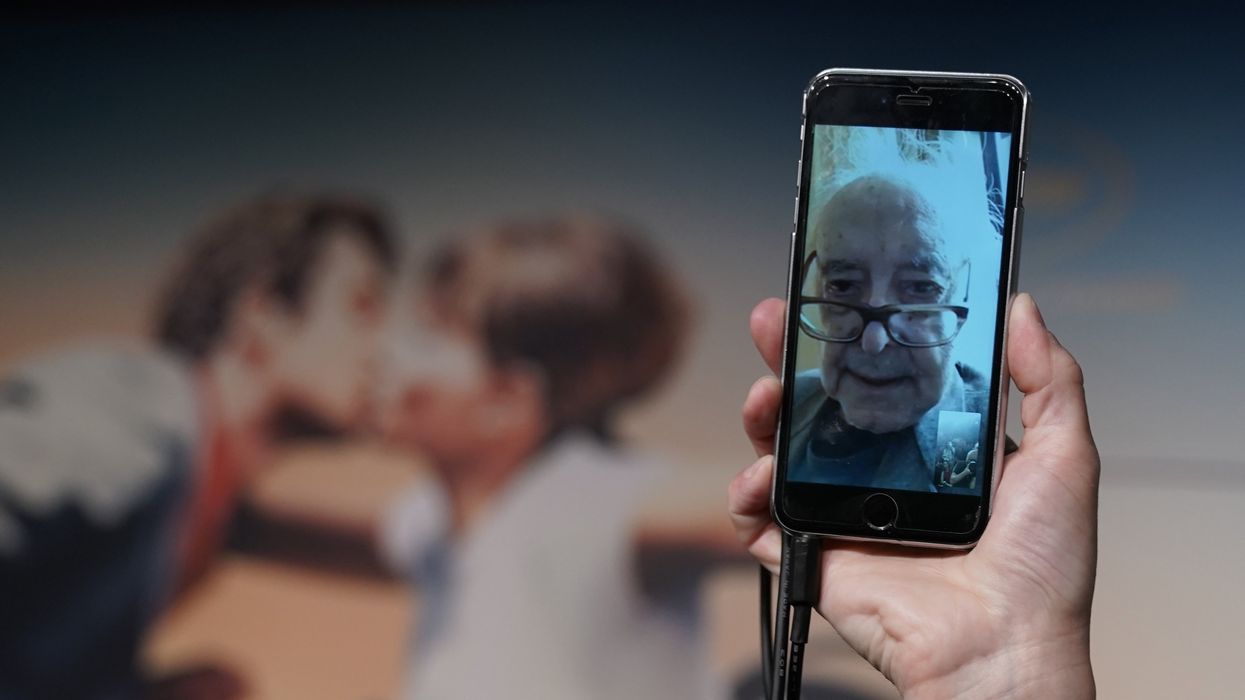'A Film is Not Designed to Dictate Anything': Jean-Luc Godard Returns to Cannes
The legendary French filmmaker used modern technology to return to the legendary French festival.

The great master provocateur and critical rabble-rouser of the French New Wave, Jean-Luc Godard returned to the Cannes Film Festival this week with the debut of his latest feature, The Image Book.
An archival-based essay film that deploys reference points as far-reaching as Michael Bay and Alfred Hitchcock (to say nothing of some sampled gay porn?), the 87-year-old director's latest abandons conventional and mainstream narrative, going for his more recently preferred approach of layered, intertextual storytelling.
It's not a method adored by all—even some of the most devoted of Godardians jumped off their passionate train of fandom several decades back—but for those still intrigued by one of cinema's most challenging and intellectually aggressive voices, a new Godard film is worth celebrating. It's also worth intense deconstruction, and at the post-screening press conference, Godard appeared via the Apple-based FaceTime app to discuss the film with curious and infinitely head-scratching journalists.
As is his way, Godard's answers were as much about his new film as they were about the cinema, and truly, the world, at large. Complete with moving image and political references that he both welcomed and discouraged analyses of, Godard's press conference was humorous—the legendary filmmaker with his eyeglasses perched on his nose and a troubling cough is an adorable sight—and wieldy. Below, are a few select quotes that hopefully may provide some intellectually-probing food for thought.
Film is not about what you see, but about what you don't
- "A film is not designed to dictate anything. A film shows what's happening. Most of the films in Cannes this year and in preceding years show what is happening, but very few films are designed to show what is not happening. I hope that my film, therefore, will show just that dimension. It depicts what is not being done, what is not happening. I think one has to think with one's hands and not with one's heads."
- "The cinema should consist not so much in showing what's happening, but films should show what's not happening, in which you [can] never see anywhere, including on Facebook."
Editing is reliant on the hands
- "The cinema has done a lot when it comes to depicting what has happened in the past and the things one might hope will happen in the future. I quickly understood what was most important was not what we call the actual 'shooting,' but the editing. The editing comes first. Film is a sort of post-production, in fact."
- "One can be much freer and think much more because editing, even digital editing, is done by hand. Just imagine for a few minutes, that you were forced to live a whole day without using your hands at all. How would you manage? How would your head move? How would you eat? How would you love without your hands? You can't do anything without your hands. That's why my film, right at the very beginning, shows that everything is based on the five fingers. When the five fingers work together, they make up a hand."
- "When it comes to the editing, I watch perhaps more films in the space of four years than Thierry Frémaux [the current Cannes Film Festival president] has watched in his entire career at the festival. I wanted to see if certain images and sounds in all of the films that I watched would really become meaningful in a film of mine. There had to be some kind of a story, a kind of storyline."

Discovering a good scene via the process of elimination
- [on his often-quoted belief that the traditional three-act structure is ruining cinema]: "If I said that quite some time ago, it was to go against [Steven] Spielberg and others who said there has to be a story with a beginning, a middle, and an end. As a joke, I said to them that things shouldn't be in that order. There can be these three components, but in a different order. Of course, I didn't make this a real battle-horse, but once I drew a parallel, which wasn't very successful, [or] an equation: if X plus 3 equals 1, than X [itself] equals -2. When you produce an image, be it of the past, the present, or the future, you have to do away with two images each time to find one really good one. That's the key to cinema, to a good film. But when you say it's the key, you shouldn't forget the lock as well."
Do not limit your ideas
- "There are things that a text or a language cannot convey. The voice is not the same as speech and speech is not necessarily language."
- "Most people today, and for quite some time, have had the courage to live their lives, but they don't have the courage to imagine it any longer. I have the courage, at least, to imagine my life, and this makes it possible to continue and board that train, the train of history."
On the filmmaker's own work
- "Almost all of the films I have made, up until three or four years ago, did refer to violence, but deep within the images, things are actually very calm."
- "A long time ago, there were 100,000 people who saw each of my films, and I wondered, 'well, after 50 or 100 years, will so many spectators still come to see my films? Of course, often it's older people who come to see my films."
To watch the entire press conference, click here.

 Richard Gere and Uma Thurman in 'Oh, Canada' via Kino Lorber
Richard Gere and Uma Thurman in 'Oh, Canada' via Kino Lorber  Uma Thurman in 'Oh, Canada'via Kino Lorber
Uma Thurman in 'Oh, Canada'via Kino Lorber 









